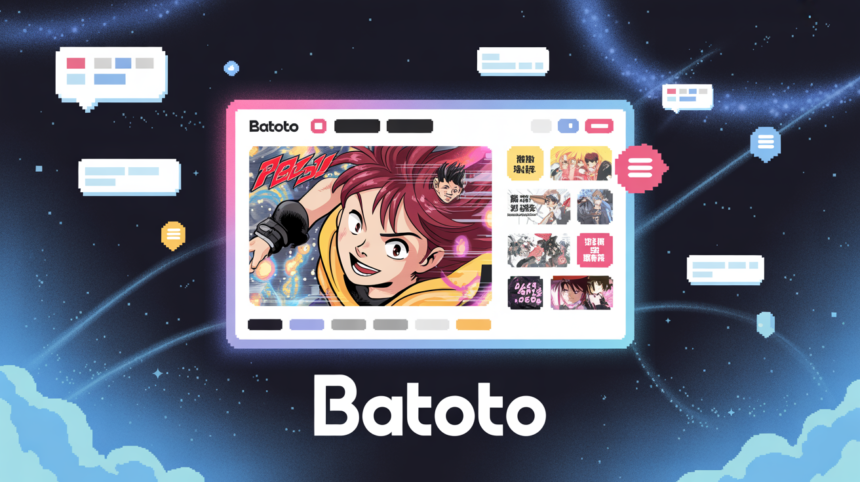In the world of online manga, Batoto was once one of the most popular platforms where readers could access thousands of manga titles for free. If you’ve ever searched for manga, chances are you’ve come across this website. But with the rise and fall of various platforms over the years, it’s natural to wonder: What happened to Batoto? Is it still relevant today? Why was it so popular? And what lessons can we learn from its rise and eventual closure?
In this comprehensive guide, we’ll cover everything you need to know about Batoto, its impact on the manga community, the reasons behind its closure, and what options are available for manga lovers now.
What Exactly Was Batoto?
Batoto was an online platform that allowed users to read manga for free. It gained popularity for its large library of manga titles and its user-friendly interface. Users could easily search for their favorite manga, track their reading progress, and engage with other manga fans in the Batoto community.
The website stood out for its clean design and an active community of manga readers. Additionally, Batoto’s focus on community-driven contributions made it a go-to site for fans who were passionate about manga culture. Fans could contribute by uploading new manga or assisting in translations, making it a space where the community helped itself grow.
Despite all the positive aspects, Batoto’s downfall came swiftly. The website was shut down in 2018 due to legal pressure from copyright holders and the threat of lawsuits. This was a significant loss to manga readers who relied on it for years to read their favorite titles.
Why Was Batoto So Popular?
Batoto’s popularity was driven by several key factors that set it apart from other manga reading platforms:
- User-Driven Contributions: Fans could upload manga and translations, giving the community more control over the content.
- Clean and Simple Design: The website was easy to navigate, which made it an ideal platform for both new readers and long-time manga enthusiasts.
- Free Access: Users didn’t have to pay a dime to access the vast library of manga titles, making it a top choice for readers looking for free content.
- Active Community: The Batoto forums and comment sections allowed readers to connect, discuss, and share their love for manga, creating a thriving online community.
- No Ads: Unlike many free manga platforms, Batoto was free of annoying pop-up ads, which improved the user experience significantly.
These features helped Batoto stand out in the crowded manga platform market. Its ease of use, community-driven features, and vast collection made it a fan favorite.
What Happened to Batoto?
Batoto’s rise and eventual fall are a reflection of the challenges faced by illegal and semi-legal manga websites. In 2018, Batoto was forced to shut down after ongoing pressure from the manga industry, including publishers and copyright holders who were concerned about their intellectual property being distributed for free.
While Batoto never directly sold or profited from manga, it did host copyrighted content without proper licensing. This situation led to legal challenges, and ultimately, Batoto’s administrators decided to pull the plug on the platform to avoid further complications.
This left many manga fans in a bit of a scramble to find alternative sources for their favorite reads. For some, it was the end of an era, and for others, it marked a shift towards more legally compliant manga platforms.
Why Did Batoto Get Shut Down?
Batoto’s shutdown highlights the ongoing struggle between fans of free manga access and the legal rights of copyright holders. While fans argue that these platforms promote the spread of manga and help build a wider audience, the fact remains that distributing manga without the permission of the copyright holders is illegal.
Some of the key reasons for Batoto’s closure include:
- Copyright Infringement: Manga publishers and creators rely on revenue from the sale of their works. Websites like Batoto, which made manga freely available, undermined these revenue streams.
- Pressure from Industry Giants: Companies like Shueisha, Kodansha, and others have taken legal action against unauthorized distribution of manga to protect their intellectual property.
- Sustainability Issues: As popular as Batoto was, it couldn’t survive without facing legal risks. Monetizing the site legally would have been an enormous challenge.
Post-Batoto: What Are the Alternatives?
After Batoto shut down, manga fans needed a new platform to read manga. While many illegal or semi-legal platforms popped up after Batoto’s demise, there are now several legal options that provide both free and paid access to manga. Here’s a breakdown of the best alternatives that emerged after Batoto’s closure.
Legal Manga Platforms
- Crunchyroll: Originally a streaming platform for anime, Crunchyroll also offers a large collection of manga. With a subscription, users can access manga in various genres, often on the same day it’s released in Japan.
- Viz Media: Known for its official licensing of popular series like Naruto, One Piece, and My Hero Academia, Viz Media offers a large catalog of manga. They have a subscription service called Shonen Jump that allows unlimited access to a massive range of manga titles.
- ComiXology: Owned by Amazon, ComiXology provides a large library of manga for purchase. They also offer a subscription service for unlimited access to certain titles.
- Manga Plus: This is a free, official platform that offers a wide range of manga titles directly from Shueisha. Manga Plus is great for those looking for a legal way to access popular manga series.
- Kodansha Manga: Kodansha’s platform offers official translations of its manga series. They’ve also partnered with other platforms, like ComiXology and Crunchyroll, to distribute their content legally.
Piracy Sites: A Risky Choice
Though many piracy sites still exist, they come with considerable risks. Using illegal platforms might get you access to manga for free, but there are many downsides:
- Legal Risks: Watching or downloading copyrighted content without authorization can lead to legal action.
- Security Issues: Piracy sites often come with pop-up ads and malware risks.
- Poor User Experience: These sites usually have poor navigation and don’t offer the same quality of service that legal platforms provide.
For anyone serious about reading manga in a way that supports creators and ensures quality, it’s better to choose one of the legal platforms mentioned above.
What Do We Learn From Batoto’s Closure?
Batoto’s story isn’t just about the loss of a beloved website—it’s a lesson in the importance of respecting intellectual property and understanding the balance between free access and supporting creators. Here’s what we can learn:
- The Importance of Licensing: Websites that provide free access to manga without proper licensing are at risk of being shut down. It’s crucial to support legal platforms that respect the rights of creators and publishers.
- The Power of Community: Batoto thrived because it encouraged community involvement. This helped create a dedicated group of users who contributed to the platform and helped it grow. This sense of community is still essential for today’s manga platforms.
- The Shift to Paid Services: The rise of legal services like Crunchyroll and Viz Media shows that many fans are willing to pay for legal access to their favorite manga. This shift is not just about monetization but about supporting the industry in a sustainable way.
Common Questions About Batoto and Manga Reading
Why did Batoto close down?
Batoto closed down because it hosted copyrighted manga without proper licensing, which led to legal action from publishers and copyright holders. The platform’s creators chose to shut it down to avoid further legal trouble.
What are the best alternatives to Batoto?
There are several great legal alternatives to Batoto, including Crunchyroll, Viz Media, Manga Plus, and ComiXology. These platforms provide official, licensed manga for both free and paid users.
Can I still find Batoto manga elsewhere?
Some of the manga that was available on Batoto can now be found on official platforms like Manga Plus or Viz Media. However, much of the content that was on Batoto is no longer legally available on unauthorized platforms.
What happened to the Batoto community?
While Batoto’s shutdown left a hole in the manga community, many former Batoto users have migrated to other platforms where they continue to engage with fellow manga fans. Platforms like Reddit, Discord, and official manga websites provide spaces for community interaction.
Was Batoto illegal?
Batoto was operating in a gray area by hosting manga without proper licensing. While it wasn’t profiting directly from the manga, it was still distributing copyrighted material without permission, which led to its eventual closure.
Conclusion: The Legacy of Batoto
Batoto may no longer be active, but its influence on the manga community is undeniable. It showed the power of free access to manga and the importance of community-driven contributions. However, it also served as a reminder of the legal challenges involved in running an unlicensed platform.
For manga lovers, the best way to enjoy manga today is through legal services that support the creators. By using these platforms, you’re not only getting access to your favorite series but also helping the industry grow and thrive.






